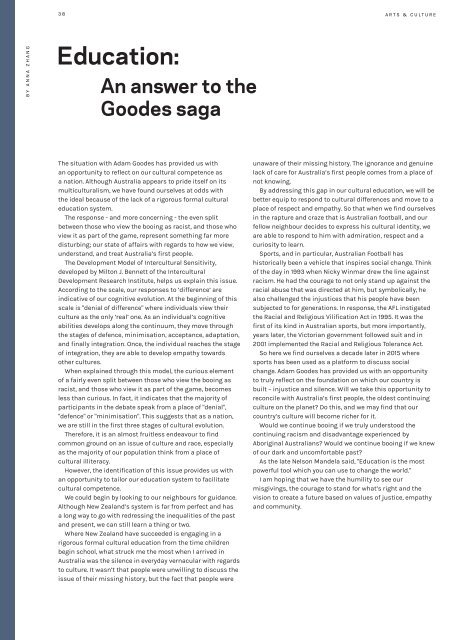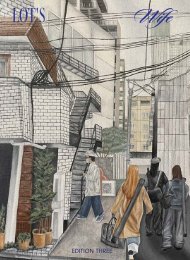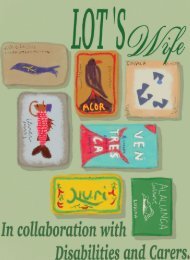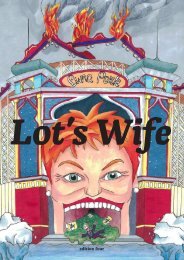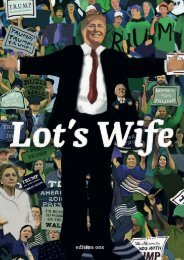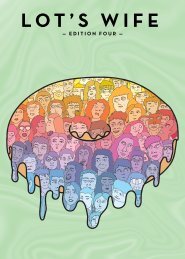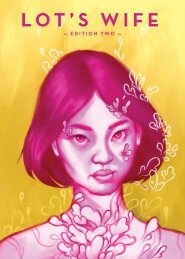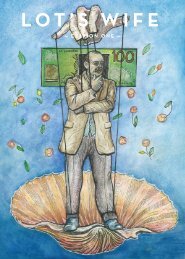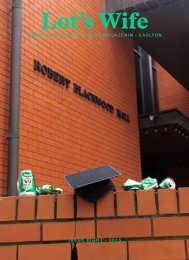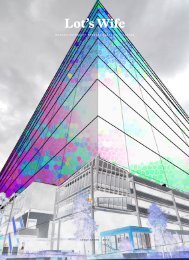Lot's Wife Edition 6 2015
You also want an ePaper? Increase the reach of your titles
YUMPU automatically turns print PDFs into web optimized ePapers that Google loves.
38<br />
ARTS & CULTURE<br />
By Anna Zhang<br />
Education:<br />
An answer to the<br />
Goodes saga<br />
The situation with Adam Goodes has provided us with<br />
an opportunity to reflect on our cultural competence as<br />
a nation. Although Australia appears to pride itself on its<br />
multiculturalism, we have found ourselves at odds with<br />
the ideal because of the lack of a rigorous formal cultural<br />
education system.<br />
The response - and more concerning - the even split<br />
between those who view the booing as racist, and those who<br />
view it as part of the game, represent something far more<br />
disturbing; our state of affairs with regards to how we view,<br />
understand, and treat Australia’s first people.<br />
The Development Model of Intercultural Sensitivity,<br />
developed by Milton J. Bennett of the Intercultural<br />
Development Research Institute, helps us explain this issue.<br />
According to the scale, our responses to ‘difference’ are<br />
indicative of our cognitive evolution. At the beginning of this<br />
scale is "denial of difference" where individuals view their<br />
culture as the only ‘real’ one. As an individual’s cognitive<br />
abilities develops along the continuum, they move through<br />
the stages of defence, minimisation, acceptance, adaptation,<br />
and finally integration. Once, the individual reaches the stage<br />
of integration, they are able to develop empathy towards<br />
other cultures.<br />
When explained through this model, the curious element<br />
of a fairly even split between those who view the booing as<br />
racist, and those who view it as part of the game, becomes<br />
less than curious. In fact, it indicates that the majority of<br />
participants in the debate speak from a place of "denial",<br />
"defence" or "minimisation". This suggests that as a nation,<br />
we are still in the first three stages of cultural evolution.<br />
Therefore, it is an almost fruitless endeavour to find<br />
common ground on an issue of culture and race, especially<br />
as the majority of our population think from a place of<br />
cultural illiteracy.<br />
However, the identification of this issue provides us with<br />
an opportunity to tailor our education system to facilitate<br />
cultural competence.<br />
We could begin by looking to our neighbours for guidance.<br />
Although New Zealand’s system is far from perfect and has<br />
a long way to go with redressing the inequalities of the past<br />
and present, we can still learn a thing or two.<br />
Where New Zealand have succeeded is engaging in a<br />
rigorous formal cultural education from the time children<br />
begin school, what struck me the most when I arrived in<br />
Australia was the silence in everyday vernacular with regards<br />
to culture. It wasn’t that people were unwilling to discuss the<br />
issue of their missing history, but the fact that people were<br />
unaware of their missing history. The ignorance and genuine<br />
lack of care for Australia’s first people comes from a place of<br />
not knowing.<br />
By addressing this gap in our cultural education, we will be<br />
better equip to respond to cultural differences and move to a<br />
place of respect and empathy. So that when we find ourselves<br />
in the rapture and craze that is Australian football, and our<br />
fellow neighbour decides to express his cultural identity, we<br />
are able to respond to him with admiration, respect and a<br />
curiosity to learn.<br />
Sports, and in particular, Australian Football has<br />
historically been a vehicle that inspires social change. Think<br />
of the day in 1993 when Nicky Winmar drew the line against<br />
racism. He had the courage to not only stand up against the<br />
racial abuse that was directed at him, but symbolically, he<br />
also challenged the injustices that his people have been<br />
subjected to for generations. In response, the AFL instigated<br />
the Racial and Religious Vilification Act in 1995. It was the<br />
first of its kind in Australian sports, but more importantly,<br />
years later, the Victorian government followed suit and in<br />
2001 implemented the Racial and Religious Tolerance Act.<br />
So here we find ourselves a decade later in <strong>2015</strong> where<br />
sports has been used as a platform to discuss social<br />
change. Adam Goodes has provided us with an opportunity<br />
to truly reflect on the foundation on which our country is<br />
built – injustice and silence. Will we take this opportunity to<br />
reconcile with Australia’s first people, the oldest continuing<br />
culture on the planet? Do this, and we may find that our<br />
country’s culture will become richer for it.<br />
Would we continue booing if we truly understood the<br />
continuing racism and disadvantage experienced by<br />
Aboriginal Australians? Would we continue booing if we knew<br />
of our dark and uncomfortable past?<br />
As the late Nelson Mandela said, "Education is the most<br />
powerful tool which you can use to change the world."<br />
I am hoping that we have the humility to see our<br />
misgivings, the courage to stand for what’s right and the<br />
vision to create a future based on values of justice, empathy<br />
and community.


